DevOps engineers play a key role in bridging the gap between development and operations teams. They ensure smooth and efficient software delivery pipelines by automating processes and fostering a culture of collaboration.
Skills required for a DevOps engineer include proficiency in automation tools, cloud services, and scripting languages, along with strong problem-solving abilities and effective communication skills.
Candidates can write these abilities in their resumes, but you can’t verify them without on-the-job DevOps Engineer skill tests.
In this post, we will explore 9 essential DevOps Engineer skills, 10 secondary skills and how to assess them so you can make informed hiring decisions.
Table of contents
9 fundamental DevOps Engineer skills and traits
The best skills for DevOps Engineers include Continuous Integration/Continuous Deployment (CI/CD), Version Control Systems, Infrastructure as Code (IaC), Containerization, Orchestration, Monitoring and Logging, Cloud Platforms, Scripting and Automation and Security Best Practices.
Let’s dive into the details by examining the 9 essential skills of a DevOps Engineer.
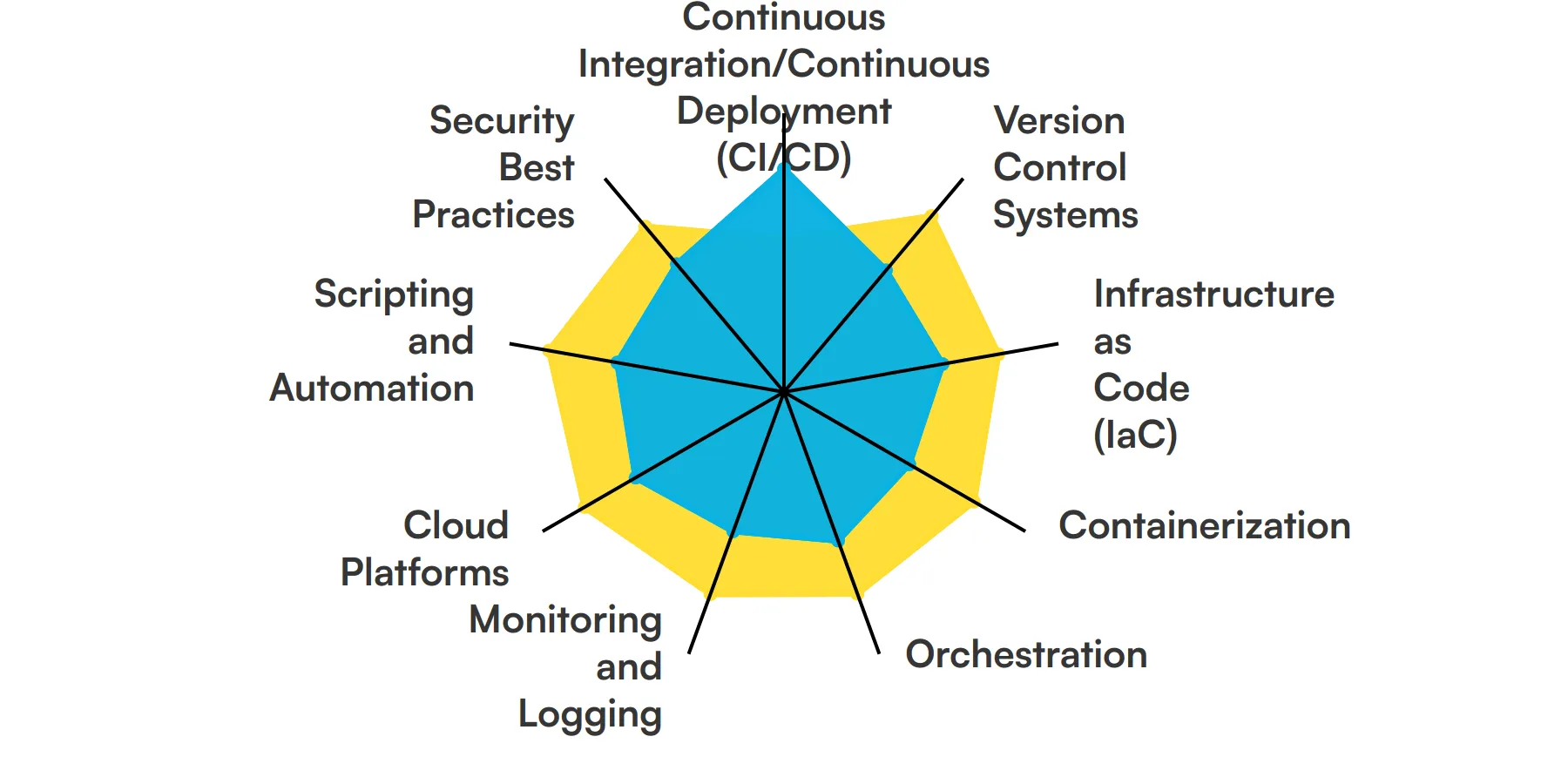
Continuous Integration/Continuous Deployment (CI/CD)
CI/CD pipelines are the backbone of a DevOps engineer's workflow. They automate the process of integrating code changes and deploying them to production, ensuring that software updates are delivered quickly and reliably. Mastery of tools like Jenkins, GitLab CI, or CircleCI is crucial for maintaining a smooth and efficient development cycle.
Version Control Systems
Version control systems like Git are essential for tracking changes in code and collaborating with other developers. A DevOps engineer uses these systems to manage code repositories, handle branching and merging, and ensure that the development team can work together without conflicts.
Check out our guide for a comprehensive list of interview questions.
Infrastructure as Code (IaC)
IaC tools like Terraform and AWS CloudFormation allow DevOps engineers to manage and provision infrastructure through code. This approach ensures that infrastructure is consistent, repeatable, and easily scalable, reducing the risk of human error and speeding up deployment times.
Containerization
Containerization technologies like Docker enable DevOps engineers to package applications and their dependencies into portable containers. This ensures that applications run consistently across different environments, from development to production, simplifying deployment and scaling.
Orchestration
Orchestration tools like Kubernetes help manage and automate the deployment, scaling, and operation of containerized applications. A DevOps engineer uses these tools to ensure that applications are highly available and can handle varying loads efficiently.
Monitoring and Logging
Monitoring and logging tools like Prometheus, Grafana, and ELK Stack are crucial for maintaining the health and performance of applications. DevOps engineers use these tools to track system metrics, identify issues, and ensure that applications run smoothly.
Cloud Platforms
Proficiency in cloud platforms like AWS, Azure, or Google Cloud is essential for a DevOps engineer. These platforms provide the infrastructure and services needed to deploy, manage, and scale applications in a cost-effective and flexible manner.
Scripting and Automation
Scripting languages like Python, Bash, or PowerShell are used by DevOps engineers to automate repetitive tasks and streamline workflows. Automation reduces manual effort, minimizes errors, and allows engineers to focus on more strategic tasks.
Security Best Practices
Understanding security best practices is crucial for a DevOps engineer to protect applications and infrastructure from threats. This includes knowledge of encryption, access controls, and vulnerability management to ensure that systems are secure and compliant with regulations.
10 secondary DevOps Engineer skills and traits
The best skills for DevOps Engineers include Configuration Management, Networking, Database Management, Collaboration Tools, Load Testing, Incident Management, Compliance and Auditing, API Management, Service Mesh and Cost Management.
Let’s dive into the details by examining the 10 secondary skills of a DevOps Engineer.
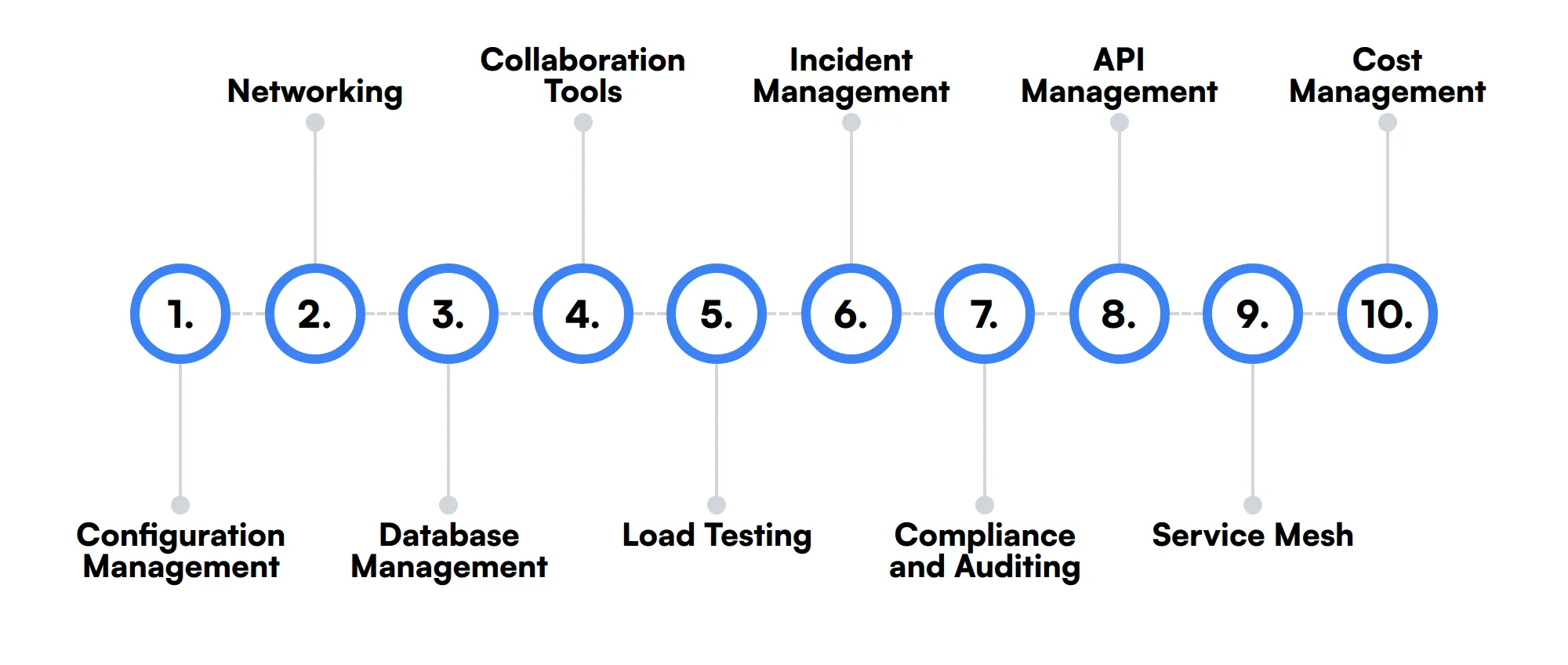
Configuration Management
Tools like Ansible, Puppet, and Chef help manage and automate the configuration of servers and applications. This ensures consistency across environments and simplifies the process of deploying updates.
Networking
A solid understanding of networking concepts, such as DNS, load balancing, and firewalls, is important for a DevOps engineer. This knowledge helps in designing and maintaining robust and secure network architectures.
Database Management
Knowledge of database management systems like MySQL, PostgreSQL, or MongoDB is useful for a DevOps engineer. This includes tasks like backup, recovery, and performance tuning to ensure that databases run efficiently.
Collaboration Tools
Familiarity with collaboration tools like Jira, Confluence, and Slack helps DevOps engineers coordinate with development and operations teams. These tools facilitate communication, project management, and documentation.
Load Testing
Load testing tools like JMeter or LoadRunner are used to simulate high traffic and identify performance bottlenecks. This helps ensure that applications can handle peak loads without degrading performance.
Incident Management
Incident management involves responding to and resolving system outages or performance issues. A DevOps engineer needs to be adept at using tools like PagerDuty or Opsgenie to manage incidents and minimize downtime.
Compliance and Auditing
Understanding compliance requirements and auditing processes is important for ensuring that systems meet regulatory standards. This includes knowledge of frameworks like GDPR, HIPAA, and SOC 2.
API Management
API management tools like Apigee or Kong help in managing and securing APIs. This includes tasks like rate limiting, authentication, and monitoring to ensure that APIs are reliable and secure.
Service Mesh
Service mesh technologies like Istio or Linkerd provide advanced networking features for microservices. They help in managing service-to-service communication, security, and observability.
Cost Management
Understanding cost management practices is important for optimizing cloud spending. This includes using tools like AWS Cost Explorer or Azure Cost Management to monitor and control expenses.
How to assess DevOps Engineer skills and traits
Assessing the skills and traits of a DevOps Engineer involves a nuanced understanding of both technical expertise and soft skills. While the technical skills like Continuous Integration/Continuous Deployment (CI/CD), Version Control Systems, and Infrastructure as Code (IaC) are quantifiable, traits such as problem-solving and teamwork are equally important but harder to measure.
Traditional methods like reviewing resumes or conducting technical interviews can provide insights, but they often fall short in accurately gauging a candidate's real-world capabilities. This is where skills-based assessments come into play, offering a more comprehensive evaluation of a candidate's ability to perform in a DevOps environment.
For a thorough assessment, consider using Adaface assessments, which are designed to test a range of DevOps competencies from Containerization and Orchestration to Monitoring and Logging, and Security Best Practices. These tests help streamline the hiring process, ensuring you find the best fit for your team. By integrating Adaface assessments into your hiring process, you can achieve an 85% reduction in screening time. Learn more about these assessments here.
Let’s look at how to assess DevOps Engineer skills with these 6 talent assessments.
AWS DevOps Test
Our AWS DevOps Test assesses proficiency in working with AWS and implementing DevOps best practices. This test is designed to evaluate a candidate's understanding of cloud computing, infrastructure as code, continuous integration and delivery, configuration management, containerization, and monitoring and logging.
The test evaluates the candidate's knowledge of AWS core services, configuration management, troubleshooting and debugging, and Python basics. It also covers Python OOPs, data structures, Linux fundamentals, and shell scripting. The test includes scenario-based questions to assess practical skills.
Successful candidates demonstrate a strong understanding of AWS technologies and DevOps practices. They show proficiency in Python programming, Linux systems, and shell scripting, which are crucial for automating and managing cloud infrastructure.
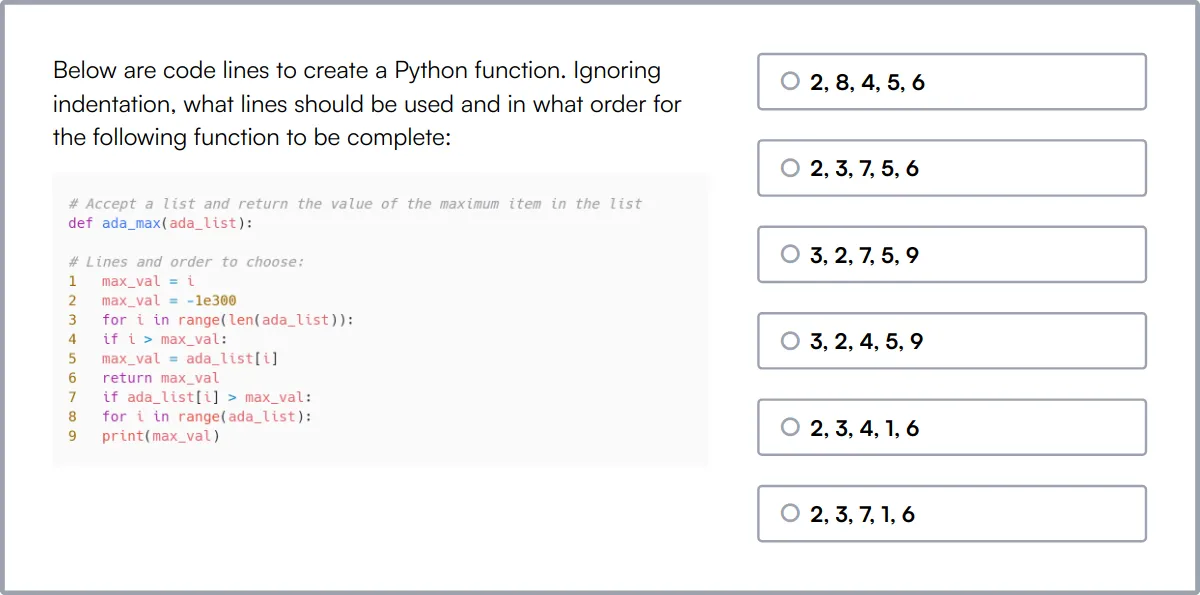
Git Online Test
Our Git Online Test evaluates candidates on their understanding of Git, a popular version control system. This test assesses knowledge of basic and advanced Git commands, conflict resolution, and proficiency in managing source code.
The test covers Git basics, repository creation, branching and merging, committing changes, and conflict resolution. It also evaluates knowledge of remote repositories, rebasing, Git workflows, and branching models. Scenario-based questions help gauge practical skills.
High-scoring candidates demonstrate a deep understanding of Git workflows and commands. They show the ability to manage code repositories effectively, resolve conflicts, and implement branching strategies.
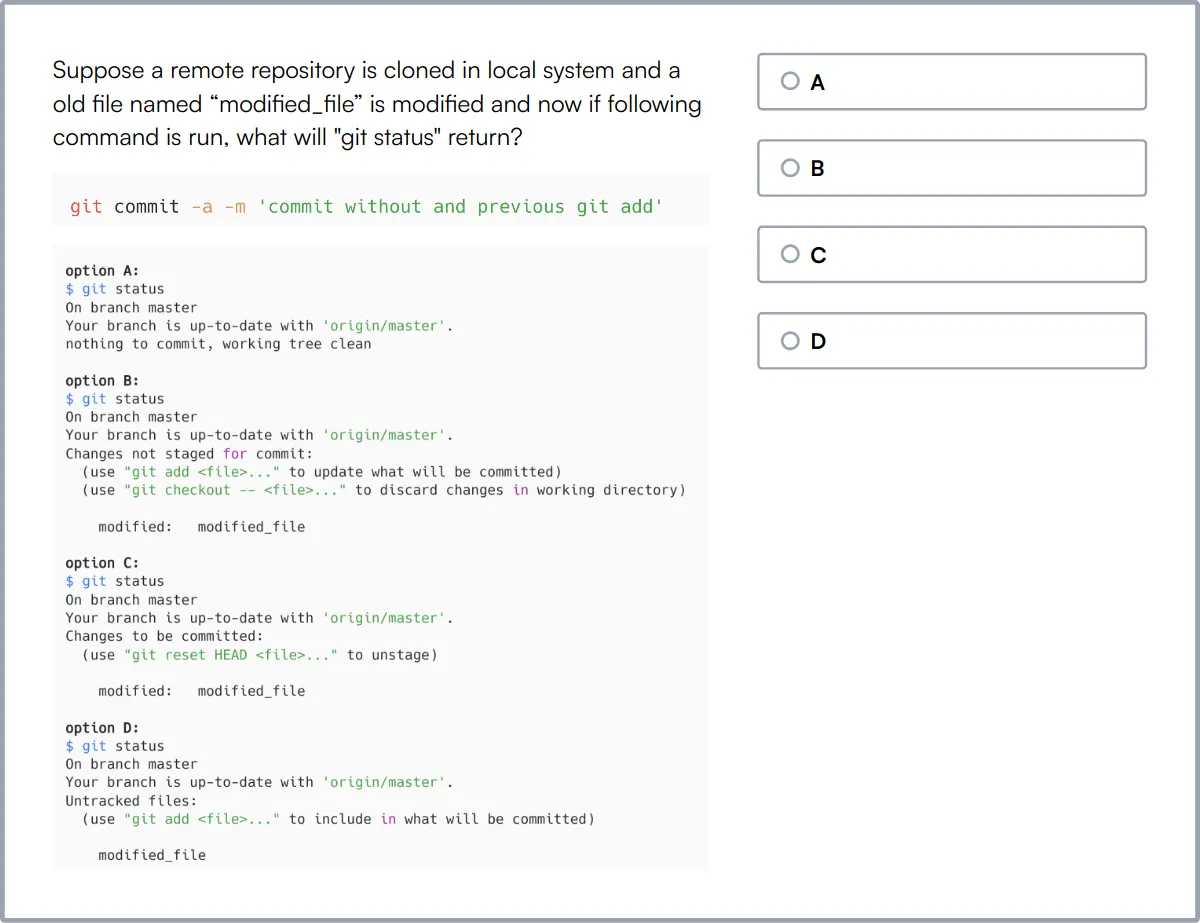
Terraform Online Test
Our Terraform Online Test evaluates a candidate's ability to define infrastructure as code using Terraform. This test assesses knowledge of Terraform's core concepts and components, including creating, deploying, and scaling various services.
The test covers Terraform basics, multi-cloud deployments, provisioning services, writing and parameterizing configuration, and state management. It also evaluates skills in creating templates, deploying services, and DevOps for Terraform. Scenario-based questions assess practical application.
Candidates who perform well demonstrate proficiency in using Terraform for infrastructure management. They show the ability to create and manage resources across multiple cloud providers and implement best practices for infrastructure as code.
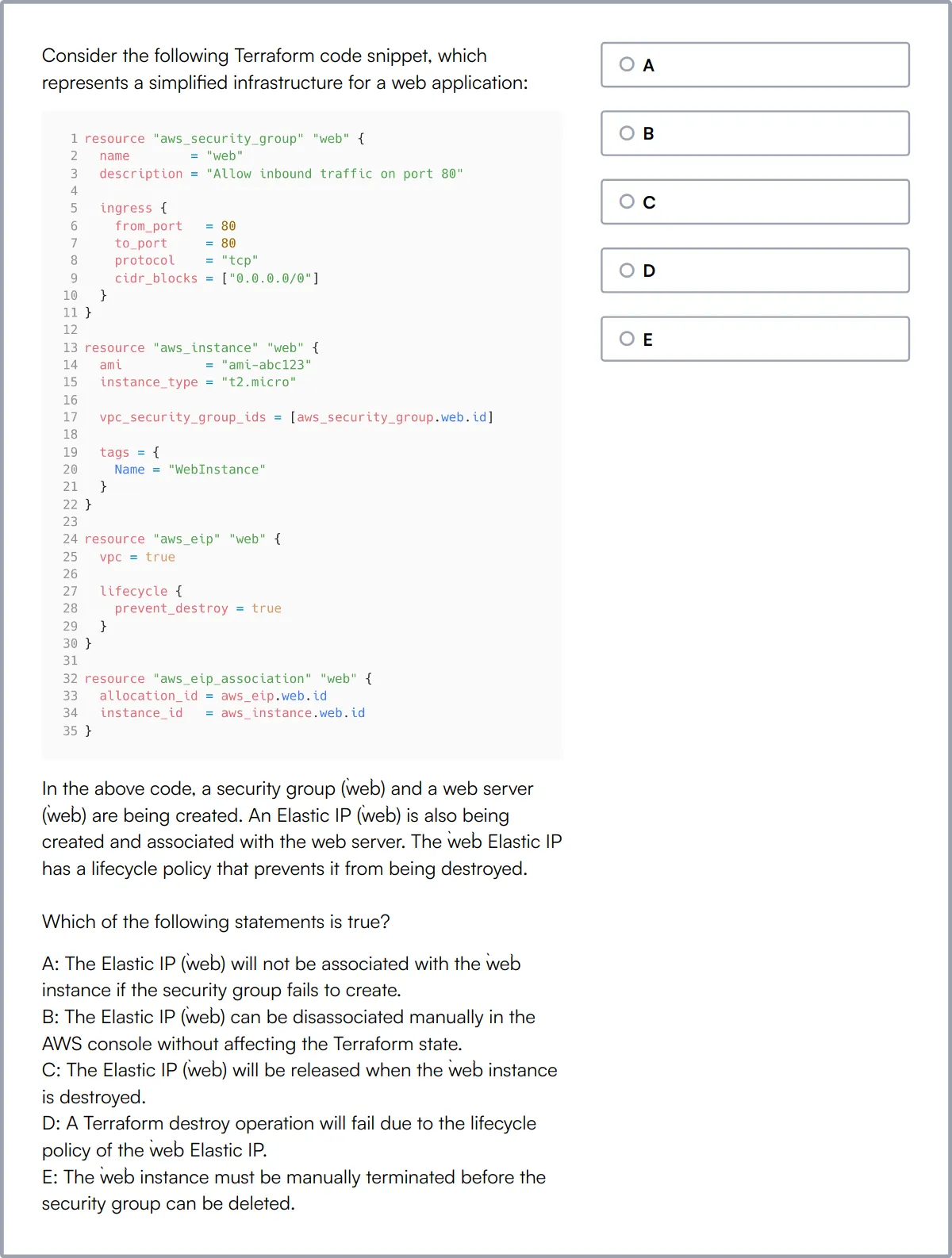
Docker Online Test
Our Docker Online Test evaluates candidates on their proficiency in working with Docker containers. This test assesses knowledge of Docker architecture, command-line interface, Dockerfile syntax, and container management.
The test covers Docker basics, images, containers, networking, volumes, compose, swarm, security, orchestration, and troubleshooting. Scenario-based questions help gauge practical skills in deploying and managing applications using Docker.
Successful candidates demonstrate a strong understanding of Docker's core concepts and best practices. They show proficiency in container orchestration, networking, and security, which are essential for managing containerized applications.
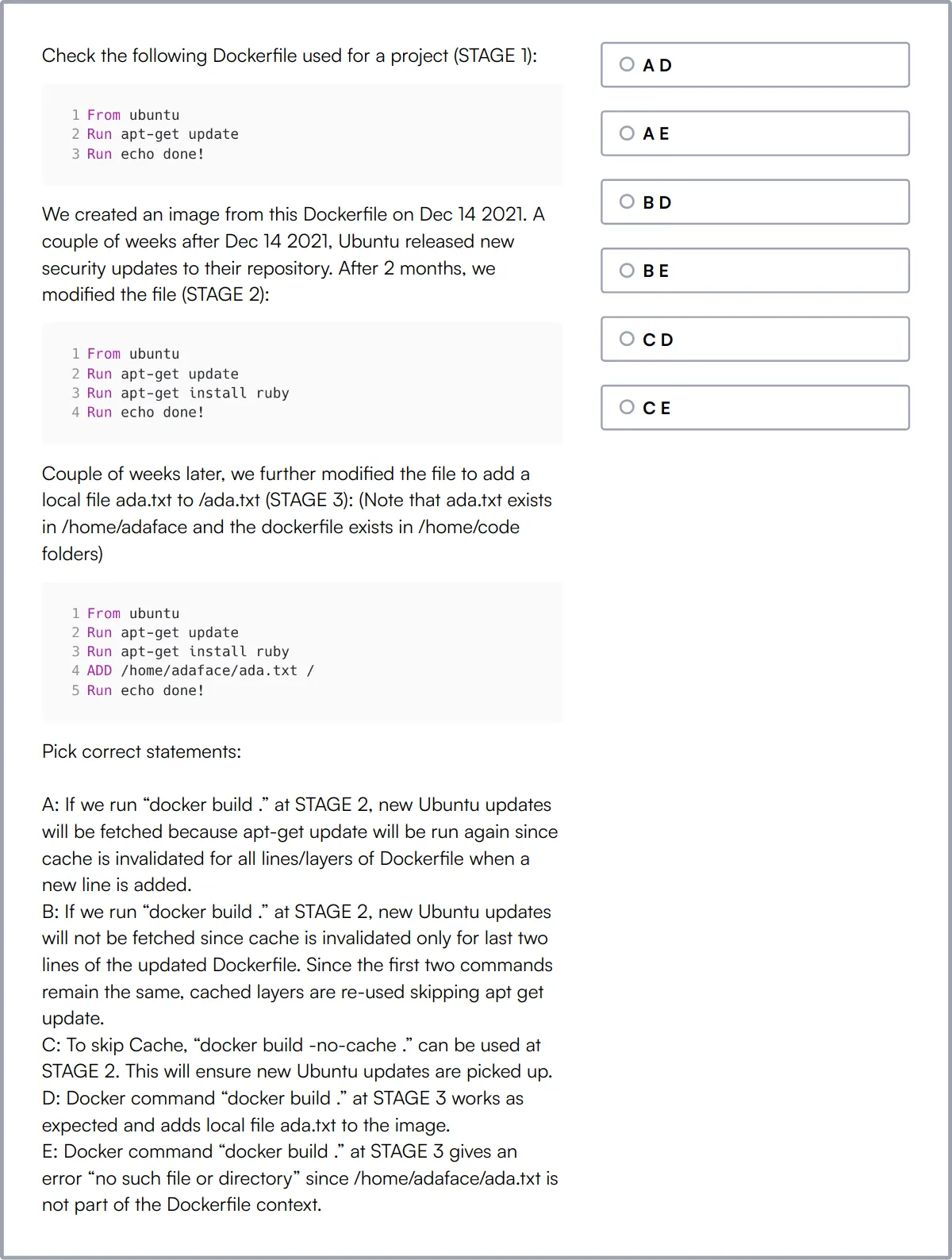
Kubernetes Online Test
Our Kubernetes Online Test evaluates candidates on their knowledge of Kubernetes architecture, setup, deployment, networking, and troubleshooting. This test assesses proficiency in managing Kubernetes clusters and resources.
The test covers Kubernetes architecture, containerization, pods, deployments, services, volumes, networking, scaling and load balancing, and security. Scenario-based questions help gauge practical skills in managing Kubernetes environments.
High-scoring candidates demonstrate a deep understanding of Kubernetes concepts and best practices. They show proficiency in deploying, scaling, and securing applications within Kubernetes clusters.
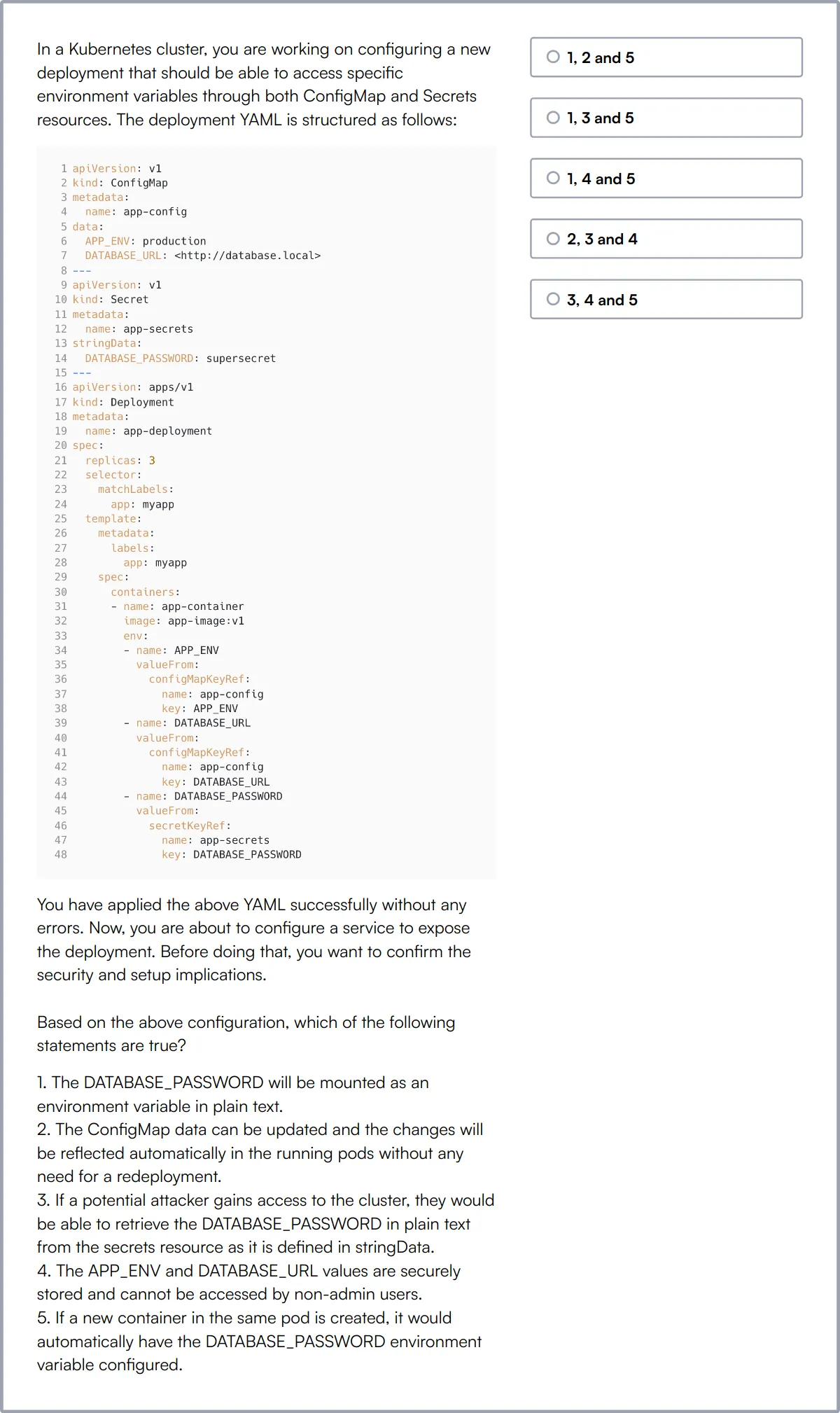
Elasticsearch Test
Our Elasticsearch Test evaluates candidates' ability to design and deploy Elasticsearch clusters. This test assesses knowledge of search queries, data indexing, document retrieval, and cluster management.
The test covers data indexing, search queries, document retrieval, aggregations, cluster management, data modeling, performance optimization, monitoring and troubleshooting, security, and scaling and distribution. Scenario-based questions help gauge practical skills.
Candidates who perform well demonstrate proficiency in managing Elasticsearch clusters and optimizing search performance. They show the ability to handle data modeling, scaling, and integration with other systems.
Summary: The 9 key DevOps Engineer skills and how to test for them
| DevOps Engineer skill | How to assess them |
|---|---|
| 1. Continuous Integration/Continuous Deployment (CI/CD) | Evaluate ability to automate and streamline code integration and deployment. |
| 2. Version Control Systems | Assess proficiency in managing and collaborating on code changes. |
| 3. Infrastructure as Code (IaC) | Check skills in automating infrastructure setup and management. |
| 4. Containerization | Gauge expertise in packaging applications into containers. |
| 5. Orchestration | Determine ability to manage and scale containerized applications. |
| 6. Monitoring and Logging | Evaluate skills in tracking system performance and diagnosing issues. |
| 7. Cloud Platforms | Assess experience with deploying and managing applications on cloud services. |
| 8. Scripting and Automation | Check proficiency in writing scripts to automate tasks. |
| 9. Security Best Practices | Evaluate knowledge of securing systems and applications. |
DevOps Test
DevOps Engineer skills FAQs
What is Continuous Integration/Continuous Deployment (CI/CD) in DevOps?
CI/CD is a practice where developers integrate code into a shared repository frequently, followed by automated builds and tests. CD extends this by deploying all code changes to a testing or production environment automatically.
How can recruiters assess a candidate's experience with Version Control Systems?
Ask candidates about their experience with tools like Git. Request examples of how they managed branches, handled merge conflicts, and used version control in their workflow.
What is Infrastructure as Code (IaC) and why is it important?
IaC is the process of managing and provisioning computing infrastructure through machine-readable scripts. It allows for consistent and repeatable configurations, reducing manual errors.
How do you evaluate a DevOps Engineer's skills in Containerization?
Inquire about their experience with Docker or similar tools. Ask for specific examples of how they containerized applications and managed container lifecycles.
What tools are commonly used for Monitoring and Logging in DevOps?
Common tools include Prometheus, Grafana, ELK Stack (Elasticsearch, Logstash, Kibana), and Splunk. These tools help in tracking system performance and diagnosing issues.
Why is Scripting and Automation important in a DevOps role?
Scripting and automation streamline repetitive tasks, reduce human error, and improve efficiency. Proficiency in languages like Python, Bash, or PowerShell is often required.
What are some key Cloud Platforms a DevOps Engineer should be familiar with?
AWS, Azure, and Google Cloud Platform (GCP) are the major cloud providers. Familiarity with their services, pricing models, and best practices is essential.
How can recruiters assess a candidate's knowledge of Security Best Practices in DevOps?
Ask about their experience with securing CI/CD pipelines, managing secrets, and implementing security tools like Snyk or Aqua. Discuss their approach to compliance and vulnerability management.

40 min skill tests.
No trick questions.
Accurate shortlisting.
We make it easy for you to find the best candidates in your pipeline with a 40 min skills test.
Try for freeRelated posts
Free resources



